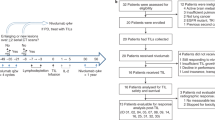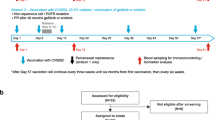Abstract
The bispecific monoclonal antibody (bsAb) BIS-1 combines a monoclonal-antibody(mAb)-defined specificity for the CD3 complex, as present on all T lymphocytes, with a mAb-defined specificity for the pancarcinoma/epithelium associated glycoprotein EGP-2. In vitro studies indicate that BIS-1 can direct T lymphocytes to kill EGP-2-positive tumour target cells. T cell pre-activation is necessary for this activity and can be obtained either via incubation of isolated peripheral blood mononuclear cells with CD3 mAb, followed by short culturing in recombinant interleukin-2-containing medium, or via costimulation with CD5- and CD28-based bsAb. Clinical application of BIS-1 was started in a pilot study in which carcinoma patients suffering from malignant ascites or intrapleural effusion were treated. In this study, ex vivo activated autologous lymphocytes were applied locally, i.e. intraperitoneally or intrapleurally, in the presence of BIS-1. Local inflammation and antitumour activity were observed, whereas no or only minor systemic toxicity was seen in these patients. Intravenous administration of BIS-1 F(ab′)2 in combination with subcutaneously given recombinant interleukin-2 (i.v. bsAb/rIL-2 treatment) induced transient but considerable toxicity including peripheral vasoconstriction, dyspnoea and fever with a maximal tolerated dose of 5–8 μg/kg. High plasma concentrations of the inflammatory cytokines tumor necrosis factor α and interferon γ were observed at this dose. Whereas bsAb-dictated antitumour activity could be demonstrated to be present in blood samples of these patients in an in vitro assay, no clear clinical responses were observed. In a rat model it was found that i.v. bsAb/rIL-2 treatment of EGP-2-positive tumours was effective when a low systemic tumour burden was present, suggesting that systemic bsAb/rIL-2 treatment might be effective in situations of minimal residual disease.
Similar content being viewed by others
Author information
Authors and Affiliations
Additional information
Accepted: 14 October 1997
Rights and permissions
About this article
Cite this article
Kroesen, B., Nieken, J., Sleijfer, D. et al. Approaches to lung cancer treatment using the CD3E×GP-2-directed Bispecific Monoclonal Antibody BIS-1. Cancer Immunol Immunother 45, 203–206 (1997). https://doi.org/10.1007/s002620050433
Issue Date:
DOI: https://doi.org/10.1007/s002620050433




